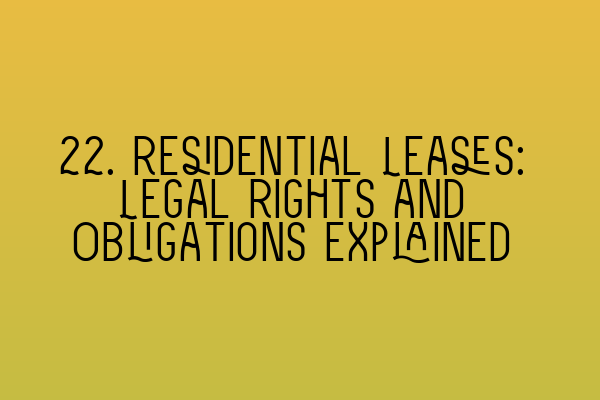22. Residential Leases: Legal Rights and Obligations Explained
Are you considering renting a property or becoming a landlord? Understanding the legal rights and obligations related to residential leases is crucial. In this comprehensive guide, we will explain everything you need to know about residential leases, ensuring you are well-informed and prepared.
What is a Residential Lease?
A residential lease, also known as a rental agreement or tenancy agreement, is a legally binding contract between a landlord and a tenant. It grants the tenant the right to occupy the landlord’s property in exchange for regular rental payments for a specific period, usually six months to a year.
Residential leases outline the rights and responsibilities of both parties and serve as a safeguard against potential disputes. It is essential to familiarize yourself with the terms and conditions of the lease before signing it to avoid any future complications.
Types of Residential Leases
There are several types of residential leases, each catering to different circumstances:
- Assured Shorthold Tenancy (AST): This is the most common type of residential lease in the UK. It offers tenants a minimum term of six months and provides landlords with the right to repossess the property after the initial fixed term, subject to proper notice.
- Regulated Tenancy: Regulated tenancies are protected by the Rent Act 1977, providing tenants with long-term security and controlled rent. These tenancies were common before the introduction of ASTs and are now relatively rare.
- Fixed-Term Tenancy: A fixed-term tenancy is a residential lease with a specified start and end date. Both the landlord and tenant must adhere to the agreed-upon terms until the lease expires.
- Periodic Tenancy: Unlike fixed-term tenancies, periodic tenancies continue from month to month or week to week without a specified end date. They offer more flexibility but require proper notice when either party wishes to terminate the lease.
Tenant Rights and Obligations
Tenants have specific legal rights and obligations that must be upheld throughout the tenancy. It is crucial to understand these rights and obligations to protect yourself as a tenant. Some key tenant rights and obligations include:
- Occupation: Tenants have the right to occupy the property for the specified lease term, as long as they fulfill their financial obligations and adhere to the terms and conditions outlined in the lease.
- Payment of Rent: Tenants are obligated to pay rent on time, as agreed upon in the lease. Failure to pay rent may result in eviction.
- Repairs and Maintenance: Tenants must report any necessary repairs or maintenance to the landlord promptly. The landlord is responsible for ensuring the property is in a habitable and safe condition.
- Quiet Enjoyment: Tenants have the right to peaceful enjoyment of the property without unnecessary interference from the landlord.
- Notice Period: If a tenant wishes to terminate the tenancy, they must provide proper notice as agreed upon in the lease.
It is important to note that these rights and obligations may vary depending on the type of tenancy agreement. Therefore, it is advised to seek legal advice or refer to the specific terms outlined in your lease for complete clarity on your rights and obligations.
Landlord Rights and Obligations
Landlords also have legal rights and obligations to ensure a smooth and lawful tenancy. Understanding these rights and obligations is essential for every landlord. Some key landlord rights and obligations include:
- Rent Collection: Landlords have the right to collect rent from the tenant on time, as agreed upon in the lease.
- Property Maintenance: Landlords must ensure the property is maintained in a habitable condition and address any necessary repairs promptly.
- Right to Enter the Property: Landlords have the right to enter the property for specific reasons, such as inspections, repairs, or emergencies. However, they must provide proper notice to the tenant.
- Security Deposit: Landlords may require a security deposit from the tenant at the beginning of the tenancy. This deposit ensures financial security against any damages or unpaid rent.
- Termination of Tenancy: Landlords must follow legal procedures and provide the appropriate notice period if they wish to terminate a tenancy.
As a landlord, it is essential to familiarize yourself with the rights and obligations outlined in the tenancy agreement and adhere to them in a fair and legal manner.
Hiring a Property Law Solicitor
To ensure a smooth and trouble-free tenancy, both tenants and landlords may benefit from legal advice and guidance from a property law solicitor. Seeking professional assistance can help you understand your rights, obligations, and legal remedies in case of any disputes.
If you require assistance with residential leases, SQE Property Law & Land Law offers expert solicitors who specialize in property law. They can provide you with the necessary support and advice throughout the tenancy process.
Whether you are a tenant looking for guidance on your rights or a landlord seeking legal assistance, SQE Property Law & Land Law is here to help. Contact us today for reliable and professional property law services.
Stay informed and up to date with our other educational resources related to the SQE exams and legal profession:
- SQE 1 Practice Exam Questions
- SQE 1 Practice Mocks FLK1 FLK2
- SQE 2 Preparation Courses
- SQE 1 Preparation Courses
- SRA SQE Exam Dates
At SQE Property Law & Land Law, we are committed to providing reliable and comprehensive legal information to help you succeed in the legal profession. Explore our website for more informative articles and resources.
Disclaimer: The information provided in this article is for general informational purposes only and should not be considered legal advice. Always consult with a qualified solicitor for personalized legal guidance.
